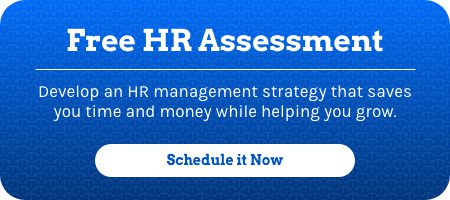In today’s competitive work environment, if something is broken there are many options for how to fix it. For example, the old way of doing HR is gone as paper becomes obsolete and manual processes are prone to mistakes. New systems exist, like an HRIS, that help simplify candidate and employee management as well as track time and process payroll. As there are several types of HRIS systems available, finding the right one for your company requires a little research.
What Does an HRIS Do?
An HRIS, or Human Resource Information System, provides the core HR functions that your company needs to run properly. It helps you track, measure and automate employee tasks to optimize your business operations. An HRIS is a database at the center of your organization, tying information—like payroll, benefits, attendance and other related data—to individuals. It also handles recruiting, tax compliance, personnel tracking and reporting. Think of an HRIS as the engine that powers your entire HR vehicle.
When Should I Get or Switch an HRIS?
When deciding on switching to another HRIS, ask yourself these questions:
- Are you having a hard time finding quality candidates?
- Are you spending too much extra time managing employee information?
- Are your files unorganized and hard to access?
- Do you make payroll mistakes?
- Do you have a high turnover rate?
If you answered ‘Yes’ to one or more of these questions, you could benefit from upgrading your HRIS.
What to Look For When Researching HRIS Options
Just as one size fits all doesn’t work with clothes or shoes, the same goes for HRISs. An HRIS should be tailored to work with your company’s size, needs and future goals; it should be made to fit your company, not the other way around. For example, a small business with fewer than 200 employees has many different HR needs than a corporation with 2,000 employees and an HRIS should reflect that. Aside from choosing a system that will meet the basic needs of your company, there are some essential functions no good HRIS should be without.
A Complete HRIS Should Assist Your Business With
An HRIS won’t do much to improve your HR processes if it doesn’t have the capabilities to hire new employees, manage the ones you have and grow them into successful, long-term additions to your company.
Applicant Tracking (ATS) and Resume Management
A good HRIS will support your recruiting and onboarding processes. It should have capabilities that allow you to integrate with major recruiting websites and post jobs with one click, send personalized emails with the help of templates, screen candidates and provide a simplified onboarding process that allows your new employees to get their paperwork out of the way so they can be productive on their very first day.
Managing Employee Information
Keeping track of the information you receive from both employees and candidates is not only a good business practice but may be required for compliance. Equal Opportunity Employers must be able to pull up every potential employee’s resume to prove they aren’t discriminating against any candidate based on race, religion, disability, sex, sexual orientation and national origin. An HRIS will automatically keep every document your employee or potential employee uploads to your system.
Storing Company Documents
Along with storing your employees’ personal information, an HRIS should be able to store company-related documents and allow employees to access them at any time. These documents include your employee handbook, updated company policies, PTO balances and time-off requests.
Benefits Administration Software
A good HRIS can help companies manage Open Enrollment (OE) with integrated cloud-based benefits administration software. Look for an HRIS that syncs benefits to payroll for a seamless process that improves efficiency and ensures accuracy.
Integration with Payroll Software
If an HRIS doesn’t integrate with payroll, is it even worth having? Payroll errors can quickly add up to increased employee dissatisfaction and costly penalties. Choose a system that integrates with the top software so your HRIS isn’t causing you more work than it saves.
Performance Development & Promotion Plans
Regular performance reviews help managers and employees negotiate Key Performance Indicators (KPIs), create and achieve goals, benefiting the company as a whole. A good HRIS automates the process with face-to-face, 360 and time-based reviews, tracking goal completion, real-time feedback, quality of hire data and predictive performance. With this data, managers can determine which employees are ready for promotion or fit into succession plans.
Log Formal Disciplinary Actions
Tracking any and every disciplinary action taken against an employee is essential when building a case for terminating their employment, especially for companies that adhere to OFCCP guidelines. An HRIS should store all disciplinary actions taken and give HR the ability to quickly produce reports to prove the termination wasn’t discriminatory.
Keep Track of Completed Training
A leading cause of turnover is a lack of communication between employers and employees, leading to an insufficient understanding of role expectations. Offering training helps your employees improve in areas they may be lacking, setting them up for success in their position and growth within the company. Any HRIS you choose should give you the ability to upload training materials directly to the employee portal and notify you when training is complete. Plus some training is required by state and federal governments, like sexual harassment training, and your HRIS should have the ability to store this information.
Retain Your Best Employees With Succession Planning
The longer you can keep your best employees, the better off your company will be; it costs an average of $4,000 to hire a new employee. Investing in an HRIS that offers succession planning helps managers identify standout employees and set them on a path for promotion and longevity at your company. Succession planning software allows managers to view performance and determine what skills gaps may exist at your company. Training can automatically be assigned to those employees who will be able to fill a future need.
Benefits of Having the Right HRIS
When you choose the right HRIS, you’ll have a tool that simplifies your HR processes, freeing up your department to focus more on big picture items that improve your company’s bottom line. This is achieved by:
Reducing Paperwork and Utilizing E-Signatures
Relying on paper to complete your HR tasks can add extra time and costs to your day. Aside from the cost of buying paper, ink and postage, hunting down employees to get their signatures takes time out of your already busy day. Reducing and even eliminating busywork will not only save time but digital files are always accessible from anywhere.
Ensuring Compliance
An automated HRIS ensures your new employee doesn’t start work until all required documents are completed and signed, including W-4s, W-9s, I-9 Employee Eligibility Verification forms, state tax withholding forms, direct deposit forms and E-Verify to verify employment eligibility in the United States. Plus, once signed with a digital signature, all of the necessary state/federal compliance forms can be shared with the appropriate department. An HRIS also allows you to check off required training, like sexual harassment training and OSHA certifications.
Producing a Faster, Automated Onboarding
Only 12% of employees strongly agree their organization does a great job of onboarding new employees, which is unfortunate since onboarding sets the tone for how your company handles procedures and introduces your culture. A fast, automated onboarding gets paperwork out of the way so your new employee can hit the ground running.
Offering Training and Learning Management
Learning and development are just as important to some employees as pay, especially for millennial employees. Offering training, certifications and other options to grow fills a need in your employees and your company.
Managing Time Off
An HRIS allows employees to request time off and managers to approve PTO based on the company’s schedule so the team isn’t down too many members at one time. It also automatically reminds employees to take their PTO and use flex accounts before the end of the year.
Giving Employees the Ability to Access Their Own Information
Employee self-service portals allow employees to update their personal and payroll information, saving HR some 14 hours a week manually completing tasks that could be automated. When the job to update information is put in the employees’ hands, so is the accuracy, reducing the number of mistakes that HR needs to make.
Improving Customer Service
When your employees receive an awesome onboarding and great ongoing training, they have the tools to do their jobs better. And highly-productive and engaged employees will also represent your company in a way that aligns with your company’s mission and goals.
Providing Better Oversight with Fewer Mistakes
One of the biggest benefits an HRIS provides is the ability to simplify and automate processes like recruiting, hiring, onboarding, training, tracking goals, reviews so you never miss a step or signature. An HRIS makes all your necessary HR processes more efficient, saving you time to focus on big picture items.
When your company runs smoothly, your employees notice. Creating a satisfying work experience from application to performance review goes a long way towards keeping your employees engaged from day one. And, engaged employees are loyal and productive employees.
Stop relying on clunky HR tools that don’t fit with your company’s needs and waste your time. Schedule a demo to see how Arcoro’s HR solutions can benefit your company.





